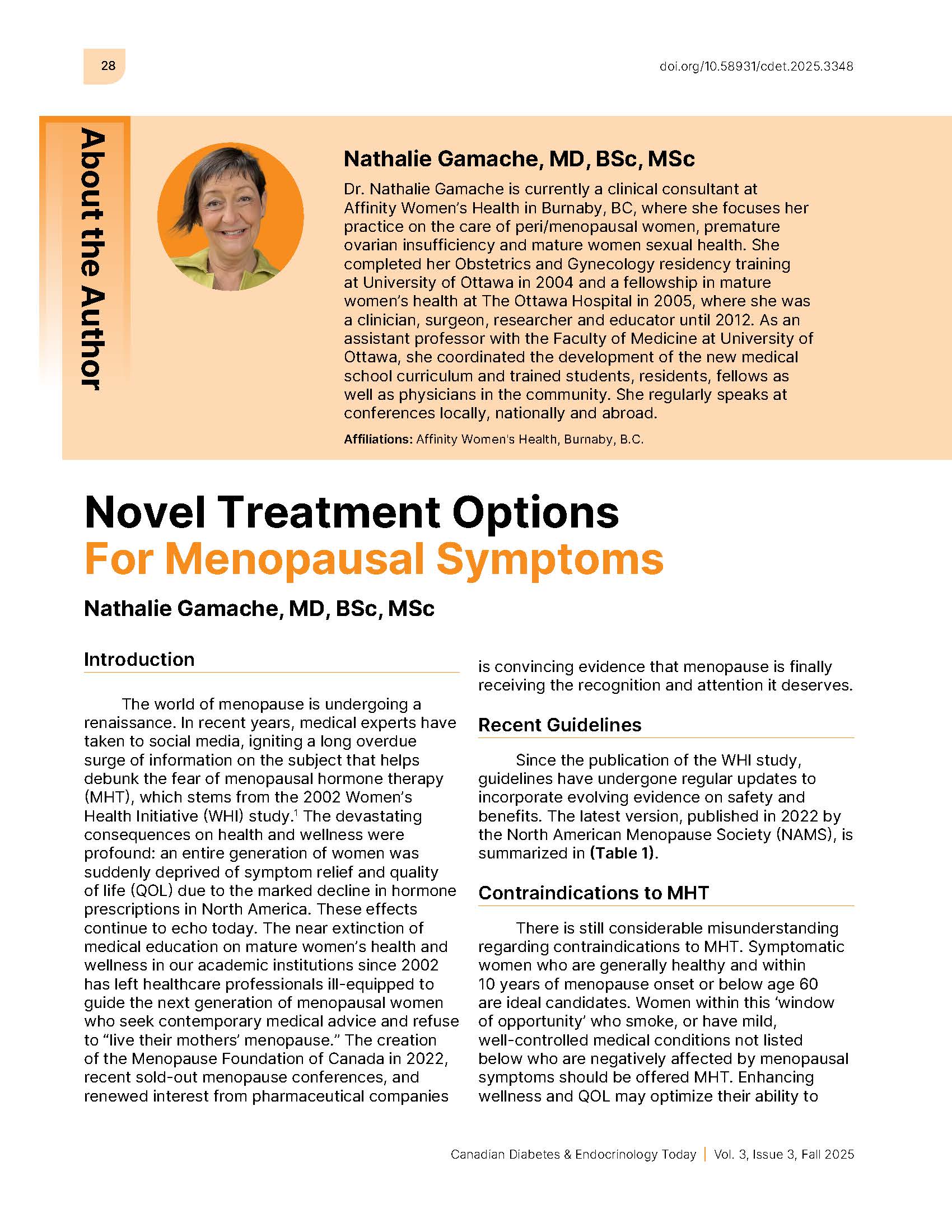Novel Treatment Options For Menopausal Symptoms
DOI:
https://doi.org/10.58931/cdet.2025.3348Abstract
The world of menopause is undergoing a renaissance. In recent years, medical experts have taken to social media, igniting a long overdue surge of information on the subject that helps debunk the fear of menopausal hormone therapy (MHT), which stems from the 2002 Women’s Health Initiative (WHI) study.1 The devastating consequences on health and wellness were profound: an entire generation of women was suddenly deprived of symptom relief and quality of life (QOL) due to the marked decline in hormone prescriptions in North America. These effects continue to echo today. The near extinction of medical education on mature women’s health and wellness in our academic institutions since 2002 has left healthcare professionals ill-equipped to guide the next generation of menopausal women who seek contemporary medical advice and refuse to “live their mothers’ menopause.” The creation of the Menopause Foundation of Canada in 2022, recent sold-out menopause conferences, and renewed interest from pharmaceutical companies is convincing evidence that menopause is finally receiving the recognition and attention it deserves.
References
Rossouw JE, Anderson GL, Prentice RL, LaCroix AZ, Kooperberg C, Stefanick ML, et al. Risks and benefits of estrogen plus progestin in healthy postmenopausal women: principal results from the Women's Health Initiative randomized controlled trial. JAMA. 2002;288(3):321-333. doi: 10.1001/jama.288.3.321 DOI: https://doi.org/10.1001/jama.288.3.321
The 2022 hormone therapy position statement of The North American Menopause Society Advisory Panel. The 2022 hormone therapy position statement of The North American Menopause Society. Menopause. 2022;29(7):767-794. doi:10.1097/GME.0000000000002028 DOI: https://doi.org/10.1097/GME.0000000000002028
Yuksel N, Evaniuk D, Huang L, Malhotra U, Blake J, Wolfman W, et al. Guideline No. 422a: menopause: vasomotor symptoms, prescription therapeutic agents, complementary and alternative medicine, nutrition, and lifestyle. J Obstet Gynaecol Can. 2021;43(10):1188-1204.e1. doi:10.1016/j.jogc.2021.08.00. Erratum for: J Obstet Gynaecol Can. 2021 Oct;43(10):1188-1204.e1. doi: 10.1016/j.jogc.2021.08.003 DOI: https://doi.org/10.1016/j.jogc.2021.08.003
Guay MP, Dragomir A, Pilon D, Moride Y, Perreault S. Changes in pattern of use, clinical characteristics and persistence rate of hormone replacement therapy among postmenopausal women after the WHI publication. Pharmacoepidemiol Drug Saf. 2007;16(1):17-27. doi: 10.1002/pds.1273 DOI: https://doi.org/10.1002/pds.1273
Goldštajn MS, Mikuš M, Ferrari FA, Bosco M, Uccella S, Noventa M, et al. Effects of transdermal versus oral hormone replacement therapy in postmenopause: a systematic review. Arch Gynecol Obstet. 2023;307(6):1727–1745. doi: 10.1007/s00404-022-06647-5 DOI: https://doi.org/10.1007/s00404-022-06647-5
Tang R, Fan Y, Ruan X, Zhang Z, Ren M, Wu J, et al. Changes in menopause-specific quality of life between women with transdermal estradiol versus oral estrogens: results of a randomized controlled trial. Gynecol Endocrinol. 2025;41(1):2484213. doi: 10.1080/09513590.2025.2484213 DOI: https://doi.org/10.1080/09513590.2025.2484213
Nolan BJ, Liang B, Cheung AS. Efficacy of micronized progesterone for sleep: a systematic review and meta-analysis of randomized controlled trial. J Clin Endocrinol Metab. 2021;106(4):942-951. doi: 10.1210/clinem/dgaa873 DOI: https://doi.org/10.1210/clinem/dgaa873
Fournier A, Berrino F, Clavel-Chapelon F. Unequal risks for breast cancer associated with different hormone replacement therapies: results from the E3N cohort study. Breast Cancer Res Treat. 2008;107(1):103-111. doi: 10.1007/s10549-007-9523-x DOI: https://doi.org/10.1007/s10549-007-9523-x
Pinkerton JV, Conner EA. Beyond estrogen: advances in tissue selective estrogen complexes and selective estrogen receptor modulators. Climacteric. 2019;22(2):140-147. doi: 10.1080/13697137.2019.1568403 DOI: https://doi.org/10.1080/13697137.2019.1568403
Davis SR. The effects of tibolone on mood and libido. Menopause. 2002;9(3):162-170. doi: 10.1097/00042192-200205000-00004 DOI: https://doi.org/10.1097/00042192-200205000-00004
De Melo NR, Pompei LM. Tibolone reduces osteoporotic fracture risk and breast cancer risk, but increases the risk of stroke. Gynecol Endocrinol. 2010;26(2):73-75. doi: 10.3109/09513590902836585 DOI: https://doi.org/10.3109/09513590902836585
Archer DF, Bernick BA, Mirkin S. A combined, bioidentical, oral, 17β-estradiol and progesterone capsule for the treatment of moderate to severe vasomotor symptoms due to menopause. Expert Rev Clin Pharmacol. 2019;12(8):729-739. doi: 10.1080/17512433.2019.1637731 DOI: https://doi.org/10.1080/17512433.2019.1637731
Canadian Menopause Society. Menopause Hormone Therapy (MHT) Products in Canada. [Accessed October 18, 2025]. Available from: https://www.canadianmenopausesociety.org/files/publications/MHT%20Table%202025%20-%20table%201-7%20final%202.pdf
Menown SJ, Tello JA. Neurokinin 3 receptor antagonists compared with serotonin norepinephrine reuptake inhibitors for non-hormonal treatment of menopausal hot flushes: a systematic qualitative review. Adv Ther. 2021;38(10):5025-5045. doi:10.1007/s12325-021-01900-w DOI: https://doi.org/10.1007/s12325-021-01900-w
Lega IC, Fine A, Antoniades LM, Jacobson M. A pragmatic approach to the management of menopause. CMAJ. 2023;195(19):E677-E672. doi: 10.1503/cmaj.221438 DOI: https://doi.org/10.1503/cmaj.221438
Santoro N, Roeca C, Peters BA, Neal-Perry G; The menopause transition: signs, symptoms, and management options. J Clin Endocrinol Metab. 2021;106(1):1–15. doi:10.1210/clinem/dgaa764 DOI: https://doi.org/10.1210/clinem/dgaa764
Labrie F, Archer D, Bouchard C, Fortier M, Cusan L, Gomez JL, et al. Intravaginal dehydroepiandrosterone (Prasterone), a physiological and highly efficient treatment of vaginal atrophy. Menopause. 2009;16(5):907-922. doi: 10.1097/gme.0b013e31819e8e2d DOI: https://doi.org/10.1097/gme.0b013e31819e8e2d
Pinkerton JV, Kagan R. Ospemifene for the treatment of postmenopausal vulvar and vaginal atrophy: recommendations for clinical use. Expert Opin Pharmacother. 2015;16(17):2703-2714. doi: 10.1517/14656566.2015.1109627 DOI: https://doi.org/10.1517/14656566.2015.1109627
Coelingh Bennink HJT, Gosden R, Stanczyk FZ, Adashi EY. The rediscovery of estetrol and its implications for estrogen treatment. Menopause. 2025;32:648–651. Published 2025 Jul 1. doi: 10.1097/GME.0000000000002537 DOI: https://doi.org/10.1097/GME.0000000000002537
Menopause Foundation of Canada. The Silence and the Stigma: Menopause in Canada. 2022. [accessed October 8, 2025]. Available from: https://menopausefoundationcanada.ca/wp-content/uploads/2023/01/MFC_The-Silence-and-the-Stigma_Menopause-in-Canada_Oct22_v2.pdf

Downloads
Published
How to Cite
Issue
Section
License
Copyright (c) 2025 Canadian Diabetes & Endocrinology Today

This work is licensed under a Creative Commons Attribution-NonCommercial-NoDerivatives 4.0 International License.
